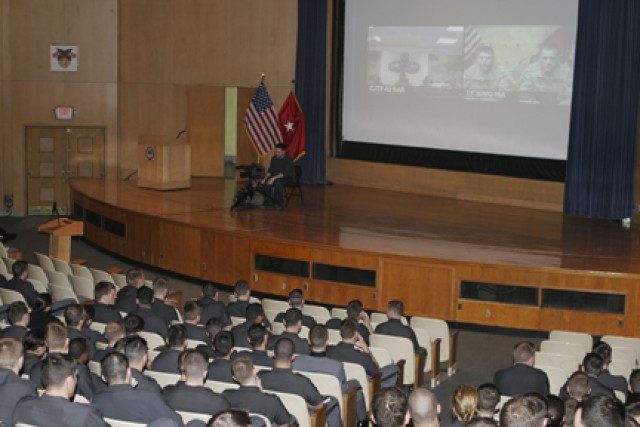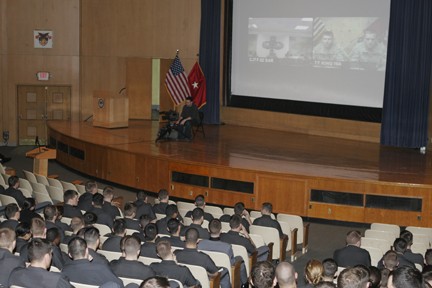
BAGRAM AIRFIELD, Afghanistan - Approximately 500 hundred West Point cadets gathered in Robinson Auditorium at West Point's Thayer Hall to learn more about the application of basic officer fundamentals, March 10.
Their instruction came not from a text book or West Point instructor, but from half-way around the world in Afghanistan where junior officers and Maj. Gen. Curtis Scaparrotti, the commander of Combined Joint Task Force-82 and the 82nd Airborne Division, offered the senior cadets, their advice and words of wisdom via video teleconference from Bagram Airfield, Afghanistan, and Forward Operating Base Airborne in Wardak
province, Afghanistan.
The cadets who participated in the VTC at West Point are currently enrolled in MX400, or the Officership course, and will graduate to become second lieutenants in less than 100 days. Many of them will become platoon leaders and be responsible for several Soldiers.
According to Lt. Col. Michael Turner, the course director for MX400, the VTC was conducted to give cadets in their last year an opportunity to hear from a combat ground commander and his junior officers about the reality of their expanding responsibilities in today's combat environment and techniques to develop this necessary expertise.
For Scaparrotti, who previously served as the Commandant of Cadets at West Point,
the VTC was an opportunity for himself and the junior officers to offer fundamental advice on leading and "taking care of Soldiers."
The topic hit home for Cadet Nick Stortini, Company H-2.
"Here (at West Point) they focus on our personal development - how to develop ourselves physically and mentally," Stortini said. But, during the teleconference, "they really talked about development and training of our Soldiers."
"Let's be clear about what taking care of Soldiers really means," said Scaparrotti, West Point Class of 1978.
In addition to ensuring Soldiers basic needs are being met, "it means being tough," added the All American commander.
The junior officers echoed the general's message of enforcing safety and training through their own personal experiences in Afghanistan.
"If you can get (your Soldiers) to do the hard things just because you tell them to in garrison....then, when it comes time, in a difficult situation in combat, they will follow you there too," said 1st Lt. Mark Zambarda, a platoon leader with Company A, 2nd Battalion, 12th Infantry Regiment, 4th Brigade Combat Team, 4th Infantry Division.
As part of the training their deployment to the Pech Valley in eastern Afghanistan, Zambarda and his platoon spent 72 hours at a live-fire range going over battle drills. The training proved useful shortly after arriving to Afghanistan.
"Me and my platoon found ourselves in a complex ambush, and we spent five hours in contact with an enemy that had greater numbers than us and greater fire-power," Zambarda said. "All that time spent training in garrison, even though no one wanted to be out there, saved our lives."
In addition to enforcing a high standard of training, the junior officers talked about the skills and techniques the future platoon leaders can develop and use to lead their future Soldiers.
Many of the young cadets will graduate and lead platoons where some of the Soldiers have much more combat experience than they do.
"As a second lieutenant,... you will not be the tactical expert in your platoon, but one way to demand respect from your platoon, right off the bat, is physical fitness," said 1st Lt. Seth Bandi, a platoon leader for a Counter Improvised Explosive Device Platoon with the 173rd Airborne Brigade Combat Team.
After the junior officers and Scaparrotti had addressed issues they saw as pertinent, cadets were given a chance to ask about any specific concerns the might have during a question and answer session.
Cadets asked questions covering topics ranging from what success in Afghanistan will look like to the more sobering topic of how a platoon leader should handle a time of loss and grief when the platoon has taken a casualty.
For Capt. Mark Moretti, during times of loss, a leader must balance his Soldiers' need to grieve with the necessity of mission accomplishment. Moretti currently serves as the company commander for Company B, 2nd Battalion, 12th Infantry Regiment, 4th Brigade Combat Team, 4th Infantry Division, which currently operates in the Korengal Valley of
Afghanistan's Kunar province.
"You need to show your other guys that it's okay to grieve for that person and mourn them," Moretti, said. "On the other hand, it's also your job, to understand that there comes a point where you say, 'We've got to go back out; we've got to get after it again. We're not going to let the memory of that guy or woman be in vain, and we're going to go back out
and finish the mission.'"
After the VTC was complete, both the cadets and the junior officers expressed their appreciation for the opportunity.
"It's great to be able to speak to the future platoon leaders," said Moretti, "somebody who is in the same boat you were in just a few years ago - to be able to talk through some of the same issues you have back then and to get a new perspective on things."
For Zambarda, a 2007 West Point graduate, just a few years ago, he was in exactly the same boat, or auditorium, as the cadets he was speaking to.
"I remember being in that same auditorium," Zambarda said. "A lot of the same things that were said when I was a cadet, I've said as a leader now. It's really the same sound message, not much has changed."
As Zambarda was looking back and remembering his time at West Point, cadets in Robinson Auditorium were looking ahead, trying to capture a glimpse of their future.
Cadet Philip Baweja, Company D-2, and Stortini, both remember Bandi, during his time as a cadet at West Point. Bandi graduated from West point in 2007 and has a sister in the Class of 2011.
"Seeing him (Bandi) in Afghanistan had an impact," Stortini said, "because that's where I plan to be in two years."
Perhaps, it is this understanding of the cadets in Robinson Auditorium, that they may literally be in the same position as the junior officers in Afghanistan that makes the message itself resonate through the years.

Social Sharing